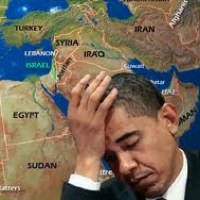![]()
Sun, May 22, 2011 | Rubin Reports | By Barry Rubin

Audience members listen to U.S. President Barack Obama deliver a speech on Mideast and North Africa policy in the Ben Franklin Room at the State Department May 19, 2011 in Washington, DC. (Source: UPI/Chip Somodevilla/POOL)
U.S. Policy: To Understand the Middle East Why Not Study The Real Middle East?
A lot of people may think that I’m too tough on President Barack Obama and the New York Times. Yet every day they do something that — despite my high suspicions and low expectations — amazes me.
Consider a New York Times article, “Obama Seeks Reset in Arab World.” First, the concept of “reset” was invented by the Obama Administration and has been used by it to describe the new policy about to be announced on the Middle East. One could not possibly think of an idea more unsuited to the region.
Reset implies starting over, forgetting everything that has happened before. Yet there is arguably no part of human society that is more obsessed with history than the Middle East. You have people ready to die and kill to realize a vision of society from more than twelve centuries ago, a reborn country that had been destroyed more than nineteen centuries ago, and the world’s longest-lasting continuing conflict that has been going full steam now for more than six decades. And those are only three examples.
Who thinks like this, that you can press a button and have history disappear? Americans, or at least a certain kind of American. The concept of reset is so remarkably ignorant and doomed to fail that it is shocking that the great geniuses who guide America haven’t thought of this problem. To my best knowledge not a single person has pointed out this fatal flaw though everyone in the Middle East innately understands it!
The Arab world isn’t erasing history so much as reliving it, heading back to the 1950s and 1960s, but with revolutionary Islamism replacing Arab nationalism. And that’s even worse.
Then there is this shocking quote from the same article:
“Obama has ordered staff members to study transitions in 50 to 60 countries to find precedents for those under way in Tunisia and Egypt. They have found that Egypt is analogous to South Korea, the Philippines and Chile, while a revolution in Syria might end up looking like Romania’s.”
I’m not a big fan of this type of political science, which never produces useful results. But leaving that aside, doesn’t anyone notice a few details? Revolutionary Islamism doesn’t really exist as a national factor in those countries. Neither does radical Arab nationalism. The three countries mentioned as being like Egypt are in fact dominated by a basic pragmatic approach, an absence of dominating ideology, a strong social flexibility.
No matter how many degrees he might have anyone who would use such a method as a guide to policymaking on a life-and-death issue is a fool. (Oops! There goes my hope of a job in the Obama Administration!)
Now, in about 400 words and taking about three minutes of your time I have explained why the current policy plans of this U.S. government are doomed. Why not instead study Egyptian history and society, the Muslim Brotherhood, and things like that?
Yet I suspect there is one more hidden factor here. The American government has this thing called the State Department and sections of the Defense Department that do this kind of thing. There are people who have been following Arab politics and ideology and the military for decades. Why not call on them for their analysis?
I think that Obama is instead turning to his clueless National Security Council staffers (the ones who wanted Husni Mubarak overthrown in 24 hours) and left-wing academics or think-tanks, and a couple of pundits (the names Zakaria and Friedman have in fact been mentioned) instead. The result is going to be something of a combination of hilariously stupid and the kind of policy that ends up setting off wars and getting tens of thousands of people killed.
But then if your advisors deny that the Muslim Brotherhood is a radical Islamist anti-American group favoring genocide against Jews — indeed argue it is sort of secular — what can one expect? If the courtiers keep calling you the smartest president in all of history how are you going to correct your errors?
Now if one could only reset Obama’s worldview….
About the author,
Barry Rubin is director of the Global Research in International Affairs (GLORIA) Center, editor of the Middle East Review of International Affairs (MERIA) Journal, and a featured columnist at PajamasMedia http://pajamasmedia.com/barryrubin/ His latest books are The Israel-Arab Reader (seventh edition), The Long War for Freedom: The Arab Struggle for Democracy in the Middle East (Wiley), and The Truth About Syria (Palgrave-Macmillan). The website of the GLORIA Center is http://www.gloria-center.org. His PajamaMedia columns are mirrored and other articles available at http://www.rubinreports.blogspot.com/.



 RSS
RSS











U.S. Policy: To Understand the Middle East Why Not Study The Real Middle East? | #Obama #jcot #tcot #twcot #p2 http://j.mp/kuslRx
U.S. Policy: To Understand the Middle East Why Not Study The Real Middle East? | #Obama #jcot #tcot #twcot #p2 http://j.mp/kuslRx